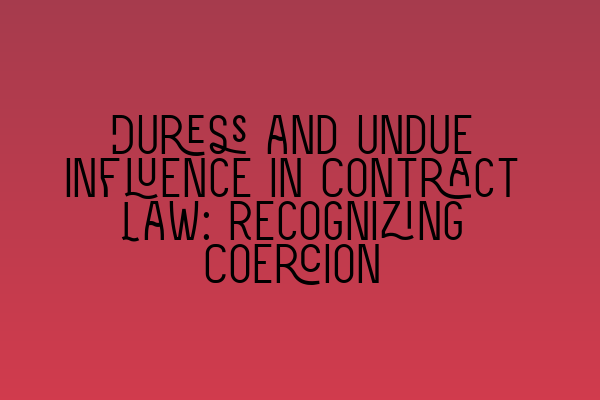Duress and Undue Influence in Contract Law: Recognizing Coercion
Welcome to SQE Contract Law, where we explore the complexities and nuances of the legal field. In this blog post, we will delve into the important topic of duress and undue influence in contract law, shedding light on the concept of coercion in contractual relationships.
Before we begin, if you’re an aspiring solicitor looking for guidance on your legal journey, we highly recommend reading our related article Mentorship for Aspiring Solicitors: Finding Guidance on Your Legal Journey. It provides valuable insights into finding the right mentor to support you along the way.
Understanding Duress in Contracts
In contract law, duress refers to situations where one party has been coerced or forced into entering a contract against their will. It involves the use of threats, violence, or other forms of pressure to induce someone to enter into an agreement. The fundamental principle behind contract law is that agreements should be entered into voluntarily and without improper influence.
Duress can arise in various scenarios, such as business negotiations, where one party may threaten legal action or harm to force the other party to sign a contract. It can also occur in personal relationships, where emotional or physical abuse is used as a means of exerting control over the other party.
It’s crucial to recognize and address instances of duress in contract law to ensure fairness and justice in contractual relationships. The law provides remedies for individuals who have been subjected to duress and allows them to seek relief or even have the contract declared void.
Uncovering Undue Influence in Contracts
Undue influence, on the other hand, refers to situations where one party takes advantage of their position of power or trust to influence the decision-making of another party. It occurs when a party exercises control over another’s will, leading them to enter into a contract that is against their best interests.
Undue influence can be especially prevalent in situations involving vulnerable individuals, such as the elderly or those with mental incapacity. In these scenarios, the law takes a particularly strict approach to protect individuals from exploitation and manipulation.
To better understand the challenges of navigating the complexities of the legal system, we recommend reading our related article Legal Challenges and Pitfalls: Navigating the Complexities of the Legal System. It provides valuable insights into common hurdles faced by legal professionals and how to overcome them.
Recognizing Coercion in Contracts
Recognizing coercion in contracts requires a careful examination of the circumstances surrounding the agreement. Both duress and undue influence involve situations where one party has been forced or manipulated into entering the contract. Some common indicators of coercion include:
- Threats of physical or emotional harm
- Pressure exerted by someone in a position of authority
- Isolation of the victim from friends and family
- Exploitation of a vulnerable individual’s lack of understanding
It’s crucial for solicitors and legal professionals to be vigilant when advising clients on contract law matters, ensuring that they recognize and address any signs of coercion.
If you’re interested in demystifying the Solicitors Qualifying Examination (SQE), the new route to becoming a solicitor, our related article Demystifying the Solicitors Qualifying Examination (SQE): What You Need to Know provides an in-depth overview of the examination and its requirements.
Seeking Legal Remedies
If a contract is formed under duress or undue influence, the affected party may seek legal remedies to invalidate the agreement or seek compensation. They may request a court to set aside the contract and restore them to their pre-contractual position.
It’s important to remember that cases involving duress and undue influence can be complex and require expert legal guidance. Therefore, it’s crucial to consult with a qualified solicitor who specializes in contract law to navigate through the legal process.
In conclusion, recognizing and addressing duress and undue influence in contract law is vital to ensure fairness and justice in contractual relationships. By understanding the signs of coercion and seeking legal remedies, individuals can protect their rights and interests.
If you’re interested in exploring alternative methods for resolving legal conflicts, we recommend reading our related article Exploring Alternative Dispute Resolution: An Effective Approach to Legal Conflicts. It provides insights into alternative methods such as mediation and arbitration.
Thank you for reading this comprehensive overview of duress and undue influence in contract law. If you have any questions or require legal assistance, please do not hesitate to contact us at SQE Contract Law. We are here to provide expert advice and support.
